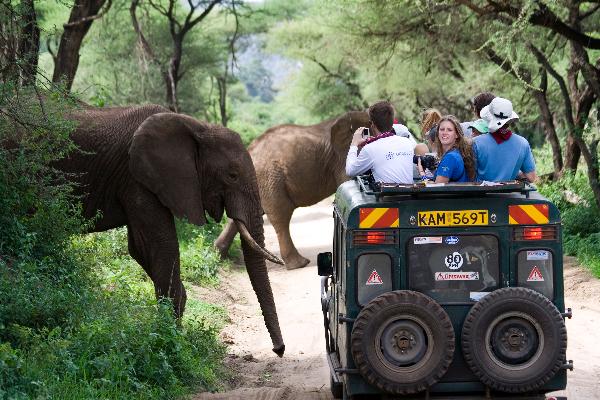SFS KENYA: ENDANGERED SPECIES (SEMESTER)

PROGRAM DETAILS
- Terms: Fall, Spring
- Credits: 18 semester-hour credits
- Prerequisites: One semester of college-level ecology, biology, or environmental studies/science; 2.7 GPA, 18 years of age
- Application Deadline: Fall: May 1st. Spring: November 1st. Early applications encouraged
- Financial Aid: All accepted students can apply for need-based scholarships, grants, and loans
OVERVIEW
Study diverse wildlife and engage in hands-on conservation research in the world-famous national parks and stunning landscapes of Kenya and Rwanda. In Kenya, the survival of several endangered, threatened, and vulnerable species hinges on many factors, including the availability of critical resources, climate change, and land use adjustments. Research the root causes of these changes and how different conservation strategies can benefit both humans and wildlife. In Rwanda, you’ll view additional iconic endangered species, compare national conservation strategies, and hike into the rainforest to witness mountain gorillas in their natural habitat.
PROGRAM HIGHLIGHTS:
- On a multi-day camping trip, explore Amboseli National Park – widely regarded as the best place in the world to observe free-ranging elephants.
- Track endangered mountain gorillas through the Rwandan rainforest with guest lecturers from the Dian Fossey Foundation. For a life changing hour, live face to face with one of the most majestic creatures on earth.
- Embark on a 2-week expedition to the nearby SFS Center in Tanzania. Students stay at our Moyo Hill Camp (MHC) site, surrounded by the famous parks of Serengeti, Ngorongoro Conservation Area, Lake Manyara, Tarangire, Arusha, and Mt. Kilimanjaro.
- Visit multiple conservancies and wildlife orphanages, learning how experts care for and use technology to steward lion, white and black rhinoceros, elephant, zebra and other wildlife populations.
- Spend the day with a local Maasai family and learn about their culture, history, daily life, and relationship with nature.
- Conduct a comprehensive field research project: Develop a research question, collect and analyze data, write a paper, and present your findings.
SFS students live and study at the Center for Endangered Species Conservation. The Center, known locally as Kilimanjaro Biodiversity Camp, lies in the heart of Kenya’s Rift Valley, between three world-famous national parks. The snow-capped peak of Mt. Kilimanjaro towers over miles of savanna, replete with a diversity of wildlife. Our sprawling, grassy campus includes traditional thatched
bandas (cabins) and a central
chumba (main building), just down the road from the small town of Kimana.
RESEARCH THEMES
- Wildlife management and sanctuaries
- Climate change resilience
- Water conservation
- Wildlife ecology and behavior
- Endangered Species
- National parks management
- Community governance of protected areas
- Conservation strategies
CORE SKILLS
- GIS
- Species identification and wildlife census
- Basic Swahili language
- Interview and survey methods
- Research design and implementation
- Data collection and analysis
- Research presentation
CONNECT WITH SFS
Visit the
SFS website
Email
admissions@fieldstudies.org
Read updates from the field on the
SFS Blog
Follow SFS on
Instagram
Check out our
Vimeo
![]()
![]()
